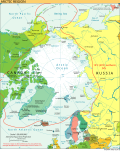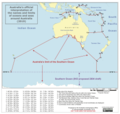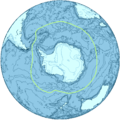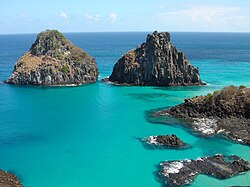Portal:Oceans
The Oceans Portal
A portal dedicated to oceans, seas, oceanography and related topics
– Hover over image and scroll to middle for controls to see more selected panorama images –
Introduction
| Earth's ocean |
|---|
|
Main five oceans division: Further subdivision: Marginal seas |
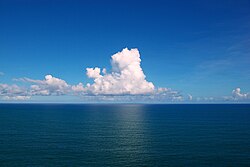
The ocean is the body of salt water that covers approximately 70.8% of Earth. The ocean is conventionally divided into large bodies of water, which are also referred to as oceans (the Pacific, Atlantic, Indian, Antarctic/Southern, and Arctic Ocean), and are themselves mostly divided into seas, gulfs and subsequent bodies of water. The ocean contains 97% of Earth's water and is the primary component of Earth's hydrosphere, acting as a huge reservoir of heat for Earth's energy budget, as well as for its carbon cycle and water cycle, forming the basis for climate and weather patterns worldwide. The ocean is essential to life on Earth, harbouring most of Earth's animals and protist life, originating photosynthesis and therefore Earth's atmospheric oxygen, still supplying half of it. (Full article...)

A sea is a large body of salt water. There are particular seas and the sea. The sea commonly refers to the ocean, the interconnected body of seawaters that spans most of Earth. Particular seas are either marginal seas, second-order sections of the oceanic sea (e.g. the Mediterranean Sea), or certain large, nearly landlocked bodies of water. (Full article...)
Oceanography (from Ancient Greek ὠκεανός (ōkeanós) 'ocean' and γραφή (graphḗ) 'writing'), also known as oceanology, sea science, ocean science, and marine science, is the scientific study of the ocean, including its physics, chemistry, biology, and geology. (Full article...)
Selected article -

A tsunami (/(t)suːˈnɑːmi, (t)sʊˈ-/ (t)soo-NAH-mee, (t)suu-; from Japanese: 津波, lit. 'harbour wave', pronounced [tsɯnami]) is a series of waves in a water body caused by the displacement of a large volume of water, generally in an ocean or a large lake. Earthquakes, volcanic eruptions and underwater explosions (including detonations, landslides, glacier calvings, meteorite impacts and other disturbances) above or below water all have the potential to generate a tsunami. Unlike normal ocean waves, which are generated by wind, or tides, which are in turn generated by the gravitational pull of the Moon and the Sun, a tsunami is generated by the displacement of water from a large event.
Tsunami waves do not resemble normal undersea currents or sea waves because their wavelength is far longer. Rather than appearing as a breaking wave, a tsunami may instead initially resemble a rapidly rising tide. For this reason, it is often referred to as a tidal wave, although this usage is not favoured by the scientific community because it might give the false impression of a causal relationship between tides and tsunamis. Tsunamis generally consist of a series of waves, with periods ranging from minutes to hours, arriving in a so-called "wave train". Wave heights of tens of metres can be generated by large events. Although the impact of tsunamis is limited to coastal areas, their destructive power can be enormous, and they can affect entire ocean basins. The 2004 Indian Ocean tsunami was among the deadliest natural disasters in human history, with at least 230,000 people killed or missing in 14 countries bordering the Indian Ocean. (Full article...)
Interesting facts -
- Croatian oceanographer Mira Zore-Armanda had difficulty gaining passage on research vessels because she was a woman.
- The Swedish American Line was the first transatlantic shipping company to operate a diesel-engined ocean liner.
- American actress Susan Oliver, after surviving a plane crash that almost ended her life, became the first woman to fly a single-engined aircraft solo from New York City across the Atlantic Ocean.
Selected list articles and Marine habitat topics
| Marine habitats |
|---|
| Coastal habitats |
| Ocean surface |
| Open ocean |
| Sea floor |
- List of oceans
- List of ancient oceans
- List of seas
- List of circumnavigations
- List of cruise lines
- List of largest lakes and seas in the Solar System
- List of marine biologists
- List of marine ecoregions
- List of maritime explorers
- List of naval battles
- List of ocean liners
- List of oceanographic institutions and programs
- List of oldest surviving ships
- List of rogue waves
- List of seafood dishes
- List of submarine topographical features
Tasks
 |
Here are some tasks awaiting attention:
|
General images -
Related portals
In the news
- 11 June 2025 – Mediterranean Sea migrant smuggling
- At least eight migrants are found dead and 22 others are missing as the United Nations International Organization for Migration and the Djiboutian government launch a joint rescue operation after migrants were forced off a boat and forced to swim to shore off the coast of Djibouti. (AP)
- 8 June 2025 – 2025 San Diego Cessna 414 crash
- All six occupants are killed after a Cessna 414 crashed into the ocean off the coast of Point Loma after takeoff from San Diego International Airport in San Diego, California, United States. (CBS News)
- 5 June 2025 – Mediterranean Sea migrant smuggling, Sudanese refugee crisis
- The Freedom Flotilla, a flotilla carrying humanitarian aid en route to Gaza with Swedish activist Greta Thunberg, Irish actor Liam Cunningham, and French European Parliament member Rima Hassan, rescue four Sudanese civil war refugees from a dinghy near Libya. (The Times of Israel) (The Print)
- 28 May 2025 – Red Sea crisis
- Israel says it launched airstrikes against targets in Houthi-controlled Yemen, destroying the last operational plane of Yemenia Airlines at Sanaa International Airport. (Reuters)
- 16 May 2025 – Red Sea crisis
- The Israeli Air Force launches airstrikes on the ports of Hudaydah and Salif in Houthi-controlled Yemen, as prime minister Benjamin Netanyahu and defense minister Israel Katz warn that if the Houthis persist in attacking Israel, their leader Abdul-Malik al-Houthi will be directly targeted. (Al Arabiya)
WikiProjects
Topics
Categories
Associated Wikimedia
The following Wikimedia Foundation sister projects provide more on this subject:
-
Commons
Free media repository -
Wikibooks
Free textbooks and manuals -
Wikidata
Free knowledge base -
Wikinews
Free-content news -
Wikiquote
Collection of quotations -
Wikisource
Free-content library -
Wikiversity
Free learning tools -
Wiktionary
Dictionary and thesaurus
Admiralty law
| Admiralty and maritime law |
|---|
| History |
| Features |
| Contract of carriage / charterparty |
| Parties |
| Judiciaries |
| International organizations |
| International conventions |
|
| International Codes |
Need assistance?

Do you have a question about oceans, seas or oceanography that you can't find the answer to? Consider asking it at the Wikipedia reference desk.
External media

- World Ocean Database and World Ocean Atlas Series – from the U.S. National Centers for Environmental Information, National Oceanic and Atmospheric Administration. Includes the World Ocean Atlas.
- European Atlas of the Seas – the European Atlas of the Seas, from the European Commission
- NOAA Research – NOAA research news, Oceanic and Atmospheric Research (OAR)
- Ocean Research – from The World Ocean Observatory
- Ocean Biodiversity Information System – "a global open-access data and information clearing-house on marine biodiversity for science, conservation and sustainable development"








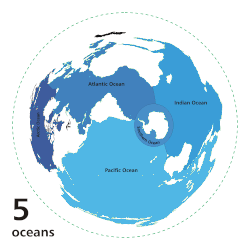









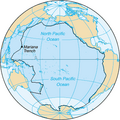
































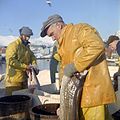







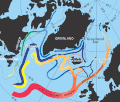



![Image 57"Terres Australes" [sic] label without any charted landmass (from Southern Ocean)](http://upload.wikimedia.org/wikipedia/commons/thumb/8/8e/Geography_world_map.jpeg/120px-Geography_world_map.jpeg)

















